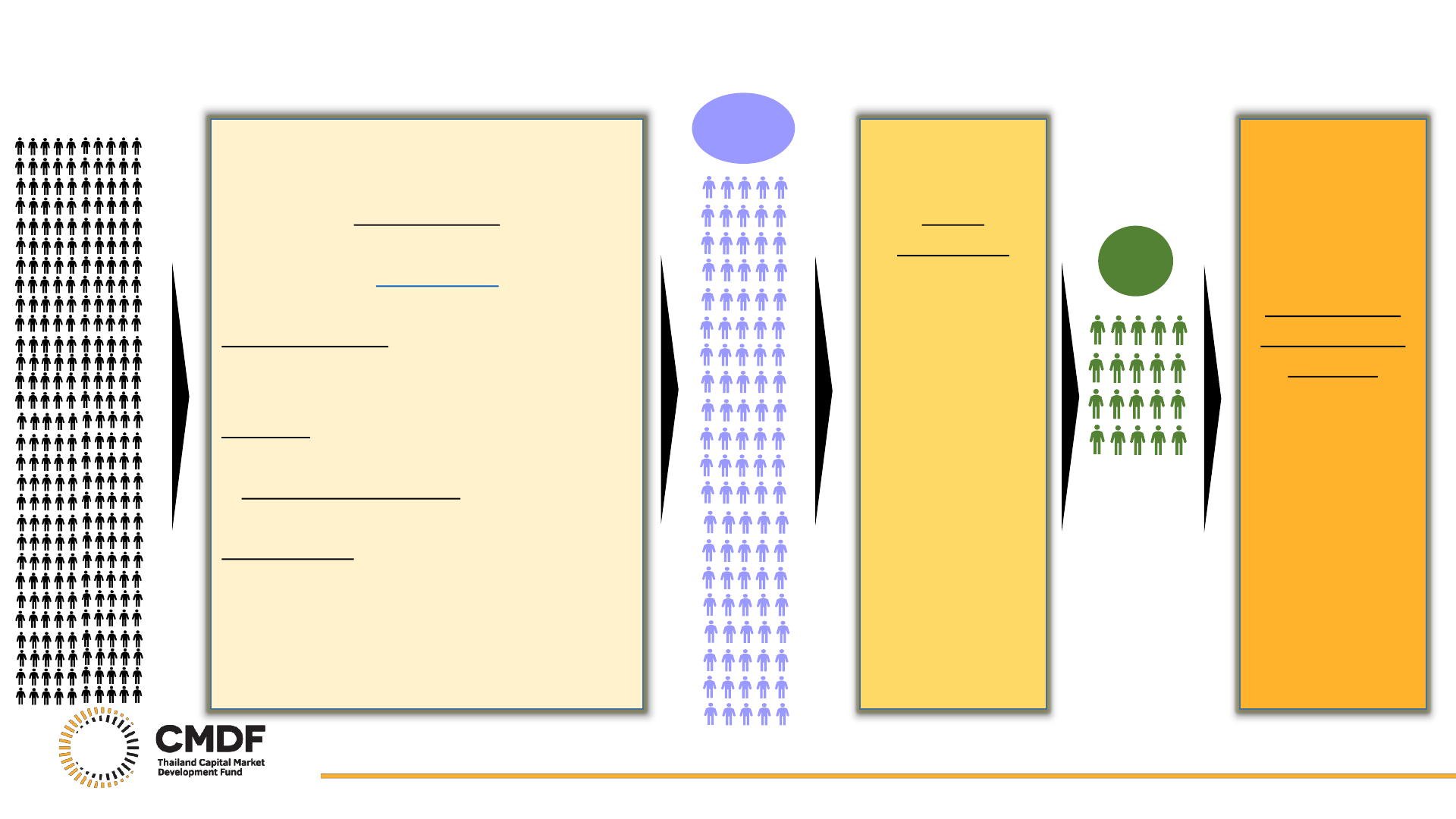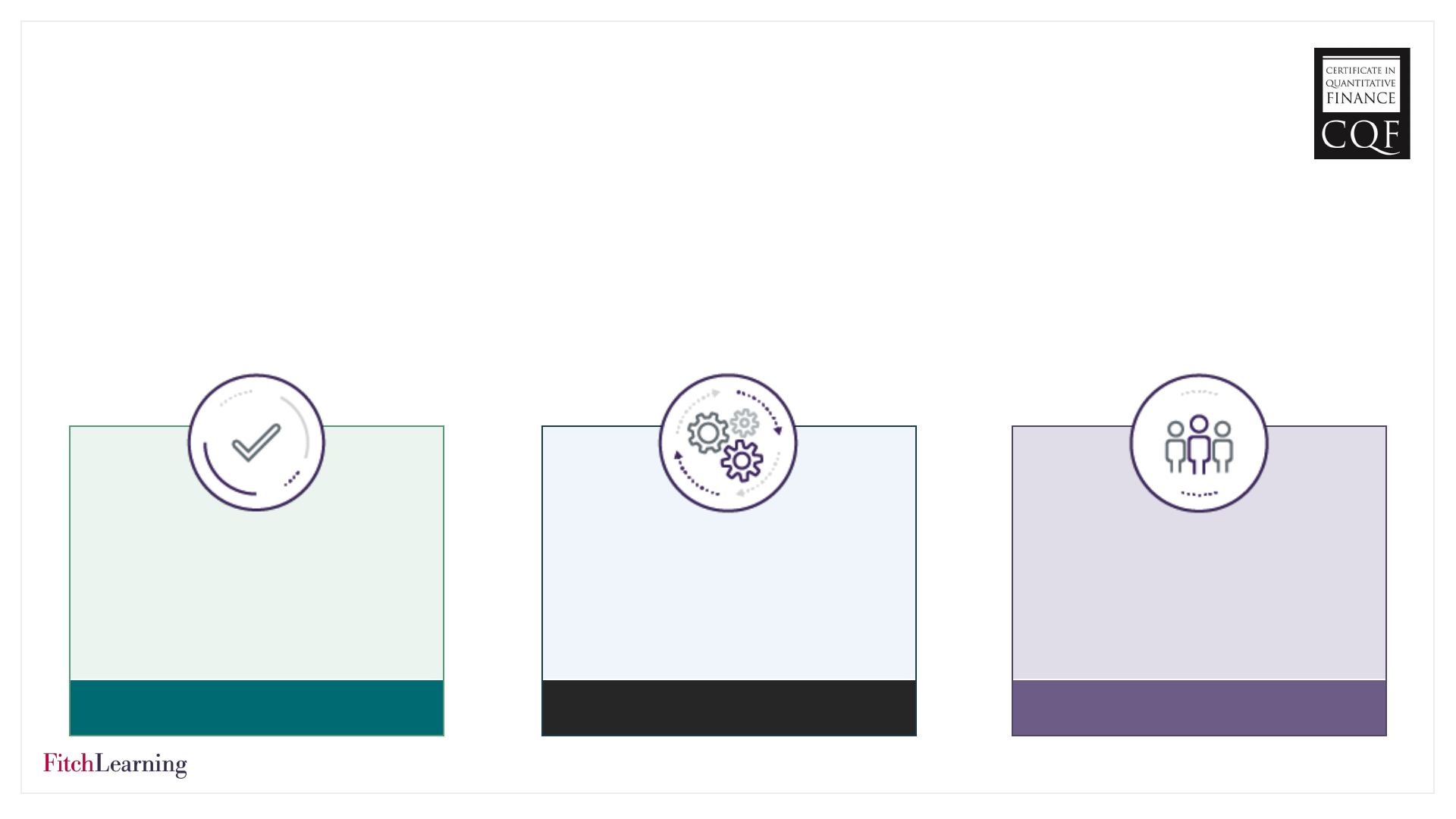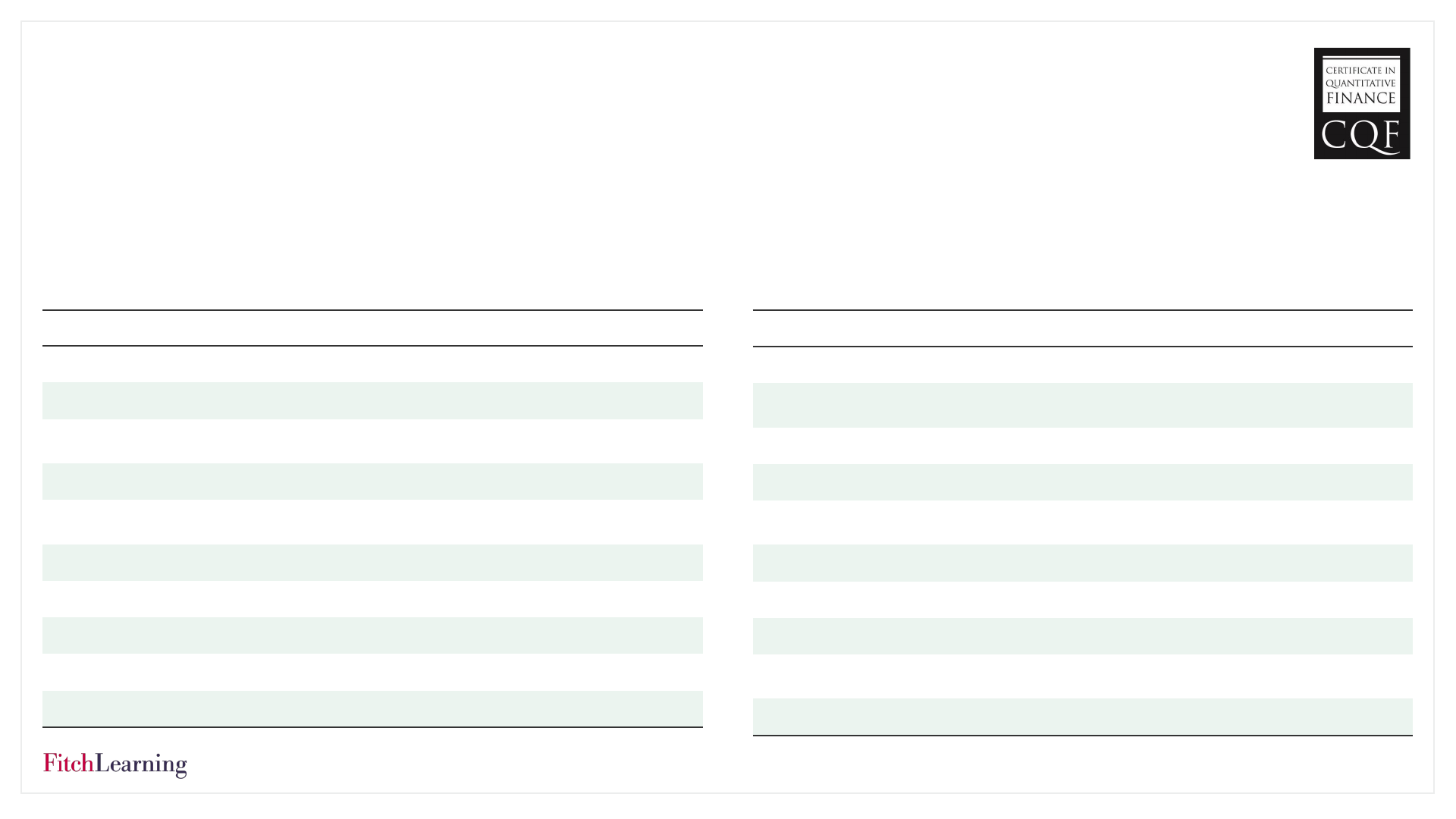
2
nd
CMDF Certificate in Quantitative Finance (CQF) Scholarship
Program
Budsara Trithipcharoenchai, Senior Executive Vice President, Thailand Capital Market Development Fund
10
th
August 2022
Introduction

To provide knowledge
regarding the Thai financial
market, investment, capital
market development, and
financial literacy to the public,
investors, citizens, and
related agencies or
organizations.
To promote the development
of organizations and
infrastructures related to the
Thai capital market, as well
as to increase the capital
market’s competitiveness on
national and international
scales.
To promote the development
of human resources for the
capital market industry or the
capital market supervision.
To support higher education,
research, and training in the
fields beneficial to the Thai
capital market.
Thailand Capital Market Development Fund (CMDF)
2
As a grant-giving organization, CMDF aims to promote the development of the Thailand capital market, with 4 statutory objectives:
1 2 3 4

About the CMDF Scholarship Program
3
Objective:
Enhancing Quantitative Finance skills to strengthen the Thai Capital Markets.
Pilot Programs:
We have given scholarships to fundamental finance & Sustainability certification programs
Finance
Sustainability
1
st
CMDF CQF Scholarship Program
2
nd
CMDF CQF Scholarship Program
▪ Prioritizing AM & Securities Co. Professionals
▪ 40 Candidates for Math and Programming Review
(Class & Exam)
▪ 20 Scholarships
▪ Open For All
▪ 100 Candidates for Math & Python Examination
▪ 20 Scholarships
Previously...
Now…

Condition for 20
CQF Scholarship
Recipients
▪ Must participate
in CMDF's
survey for
research
purposes.
20 CQF
Scholarships
▪ 100 Applicants
for Scholarship
Exam
▪ Awarded to Top
20 candidates
with
Examination
minimum score
of 60% by
ranking**
Selection Criteria
Interest applicants need to register for the program
at (www.cmdf.or.th)
Limit only 100 applicants
Eligible candidates:
1. Thai Nationality
Approach:
1. Open to all and limit only 100 applicants on a
first-come-first-served basis
Application Fee: THB 400
AIMC* (assigned by CMDF) will manage all process
(registration, fee collection and examination)
20 CQF Scholarships
4
Applicants
100
20
* AIMC = Association of Investment Management Companies
** In case of a tie, the scholarship
will be awarded by Lucky draw.

Application Process and Timeline
5
Registration Period*
(www.cmdf.or.th)
The application fee : THB 400
Registration opens at 9 a.m.
1
TIMELINE
15
th
– 31
th
Aug 2022
** Mathematic and Python
Programing
100 Eligible Applicants
Announcement
(www.cmdf.or.th)
Scholarship Examination**
Exam Location : Sasin
Graduate Institute of
Business Administration
CQF Preparation: Primer
Courses
CQF Program
2
3
4
5
1
th
Oct 2022
9 a.m. – 12 p.m.
Mid Nov to
Early Dec 2022
24
th
Jan 2023
5
th
Sep 2022
6
19
th
Oct 2022
20 Scholarship Recipients
Announcement
(www.cmdf.or.th)
* Registration will be closed
once the 100 candidate quota is
filled.

7

Delivered By
CQF Executive Summary for
Thailand Capital Market
Development Fund
10
th
of August 2022
Prepared by:
Randeep Gug, PhD, CQF – Managing Director, CQF
Christian Figorito – Senior Director, CQF
Karl Viscayno – APAC Institutional Relations, CQF

1
The Thailand Capital Market Development Fund (CMDF) is looking to develop & promote quant finance expertise across Thailand’s
Capital Market industry. Through a comprehensive syllabus and a unique balance of theory and practice, the CQF have been helping
many organizations develop incoming talent and upskill existing employees in order to bring current, essential quantitative finance,
data science and machine learning techniques within their teams.
The unparalleled flexibility of the program ensures that employees gain cutting-edge skills while being able to continue to work and
allows up to three years to complete the qualification.
Executive Summary
www.cqf.com
Learn practical techniques from
a globally renowned faculty and
apply them the moment you
return to your desk.
IMPACT
Over 8,000 professionals in 90+
countries have chosen the CQF.
CQF alumni lead the industry at
the forefront of quant finance.
EXPERTISE
The world’s largest quantitative
finance certification program.
Over 19 years of experience in
training finance professionals.
TRUSTED

22
About the CQF
World’s largest professional qualification for quantitative finance
8,000+ Alumni globally in over 90 countries
Masters-level education delivered online, over 6 months
2 Cohorts every year - January and June
Full flexibility, allowing up to 3 years to complete (6 cohorts)
Cutting-edge, practical quant finance and data science skills
Practical exams and final project to ensure mastery can be applied
Flexible learning, with unparalleled faculty support
Delivered by world-renowned practitioners, led by
Dr. Paul Wilmott
Awarded by the CQF Institute, part of Fitch Learning
Trusted by hundreds of repeat sponsoring clients
Helping people master
quant finance for
20 Years
www.cqf.com

3
Some of our Clients & Sponsoring Institutions
www.cqf.com

4
Name
Position
Location
Siam East Solutions
Chief Financial Officer
Thailand
TMBThanachart
Bank
Head of Integrated Risk Management
Thailand
Morgan Stanley
Executive Director,
Global Lead Surveillance
Tuning Analytics
Japan
UBS
Chief Risk Officer
Japan
Nikko Asset
Management
Vice President, Market Risk Team
Japan
RBS
Vice President, Currencies
Australia
Citi
Vice President, Valuation Control & Analytics
Australia
National Australia Bank
Head of FX e
-Trading
Australia
Manulife
Vice President & Chief Product Officer
Hong Kong
DBS Bank
SVP of Wealth Management Solutions
Hong Kong
Name
Position
Location
Crédit Agricole CIB
Managing Director
Hong Kong
ING Wholesale Banking
Director, Market Risk Management & Product
Control
Singapore
HSBC
Managing Director
- Chief Compliance Officer
Singapore
GE Capital
Risk Strategy Leader
Singapore
UOB Bank
Head of Quantitative Analytics, Global
Markets
Singapore
Julius Baer
Head Markets Risk and Product Control Asia
Singapore
Standard Chartered
Head, Financial Engineering Credit Risk
Singapore
Barclays
Senior Vice President, Internal Audit
India
Credit Suisse
Director, Head of EMEA & Swiss Product
Control Analytics, India
India
JP Morgan
VP, Model Governance Group Equities
India
Some of the CQF Alumni in the Financial Sector, in APAC
www.cqf.com
The CQF program has been used throughout the financial sector and the APAC region to help upskill employees from a number of organisations.
Many CQF alumni progress to take up significant leadership positions.
Below shows a small selection of current positions taken by CQF alumni within the Financial Sector, in APAC

5
The core program consists of:
Six core modules
Two advanced electives
Three exams
One final project
The Library consists of:
900+ hours of lectures
100+ hours of masterclasses
70+ hours of C++ tuition
The latest CQF curriculum
Optional primers:
Mathematics
Python Programming
Finance
CQF Program Overview: Three Phases
www.cqf.com
Made up of six modules, two
chosen advanced electives, three
exams and a final project. Each
exam is a practical assessment of
knowledge and skills.
Available at no extra cost to alumni
can keep pace with the latest quant
finance skills with permanent
access to our Lifelong Learning
library.
Delegates prepare for their first
lectures through our unique
Python Programming,
Mathematics and Finance Primers.
The CQF program can be split into the following three phases:
Preparation CQF Qualification
Lifelong Learning

6
Mathematics Primer
Teaches you how to program in
Python from the beginning:
Python syntax
Standard mathematical functions
SciPy and NumPy libraries
Good programming practices
Documenting code and debugging
Introduces key concepts and
asset classes:
Macroeconomics
Capital markets fundamentals
Introduction to money markets
Time value of money
Introduction to financial assets
Covers the mathematical
preliminaries needed for quant
finance:
Calculus
Differential equations
Linear algebra
Probability
Statistics
Preparation: Primers
www.cqf.com
The Python Programming Primer is ideal if
you’re new to coding, it assumes no prior
knowledge and will teach you Python from
the beginning.
The Finance primer introduces the key
financial concepts and range of asset
classes that will be discussed in the CQF.
The Mathematics Primer has been
carefully designed to refresh the core
mathematical tools used within
quantitative finance.
Delegates can access primers as soon as their CQF enrolment has been processed.
Python Programming Primer Finance Primer

7
The qualification is made up of six modules and advanced electives. Modules two, three, and four are examined. At the end of
module six, all delegates complete a practical project and apply their theoretical knowledge to real-world problems.
CQF: Modules
www.cqf.com
Module Two
Quantitative Risk and Return
In module two, you will learn about the classical portfolio
theory of Markowitz, the capital asset pricing model, and
the recent developments of these theories. We will
investigate quantitative risk and return, looking at
econometric models such as the ARCH framework and
risk management metrics such as VaR and how they are
used in the industry.
Modern portfolio theory
Capital asset pricing model
Portfolio optimization for portfolio selection
Risk regulation and Basel III
Value at risk and expected shortfall
Collateral and margins
Liquidity asset liability management
Volatility filtering (GARCH Family)
Asset returns: key, empirical stylized facts
Volatility models: The ARCH Framework
Module Three
Equities and Currencies
In module three, we will explore the importance of the
Black-Scholes theory as a theoretical and practical
pricing model, which is built on the principles of delta
heading and no arbitrage. You will learn about the theory
and results in the context of equities and currencies
using different kinds of mathematics to make you
familiar with techniques in current use.
The Black-Scholes Model
Hedging and the Greeks
Options strategies
Early exercise and American options
Finite-difference and methods
Monte Carlo simulations
Exotic options
Volatility arbitrage strategies
Martingale theory for pricing
Girsanov’s theorem
Advanced Greeks
Derivatives market practice
Advanced volatility modeling in complete markets
Non-probabilistic volatility models
Module One
Building Blocks of Quantitative Finance
In module one, we will introduce you to the rules of
applied Itô calculus as a modeling framework. You will
build tools using stochastic calculus and martingale
theory and learn how to use simple stochastic
differential equations and their associated Fokker-
Planck and Kolmogorov equations.
Random behavior of assets
Important mathematical tools and results
Taylor series
Partial differential equations
Transition density functions
Fokker-Planck and Kolmogorov
Stochastic calculus and Itô’s Lemma
Manipulating stochastic differential equations
Martingales
The binomial model for asset prices

8
The qualification is made up of six modules and advanced electives. Modules two, three, and four are examined. At the end of
module six, all delegates complete a practical project and apply their theoretical knowledge to real-world problems.
CQF: Modules (Cont.)
www.cqf.com
Module Five
Data Science and Machine Learning II
In module five, you will learn several more methods used for
machine learning in finance. Starting with unsupervised
learning, deep learning and neural networks, we will move
into natural language processing and reinforcement
learning. You will study the theoretical framework, but
more importantly, analyze practical case studies exploring
how these techniques are used within finance.
Unsupervised learning techniques
K-means clustering
Self-organizing maps
T-distributed stochastic neighbor embedding
Uniform manifold approximation and projection
Autoencoders
Artificial neural networks
Neural network architectures
Natural language processing
Deep learning and NLP tools
Reinforcement learning
Practical machine learning case studies for finance
AI-based Algorithmic Trading strategies
Quantum Computing
Module Six
Fixed Income and Credit
In the first part of module six, we will review the multitude
of interest rate models used within the industry, focusing on
the implementation and limitations of each model. In the
second part, you will learn about credit and how credit risk
models are used in quant finance, including structural,
reduced form, as well as copula models.
Fixed-income products and market practices
Yield, duration, and convexity
Stochastic interest rate models
Probabilistic methods for interest rates
Calibration and data analysis
Heath, Jarrow, and Morton
Libor market model
Structural models
Reduced-form model and the hazard rate
Credit risk and credit derivatives
X-valuation adjustment (CVA, DVA, FVA, MVA)
CDS pricing, market approach
Risk of default, structural and reduced form
Implementation of copula models
Module Four
Data Science and Machine Learning I
In module four, you will be introduced to the latest data
science and machine learning techniques used in finance.
Starting with a comprehensive overview of the topic, you
will learn essential mathematical tools, followed by a deep
dive into supervised learning, including regression methods,
k-nearest neighbors, support vector machines, ensemble
methods, and many more.
What is mathematical modeling?
Math toolbox for machine learning
Principal component analysis
Supervised learning techniques
Linear regression
Penalized regressions: lasso, ridge, and elastic net
Logistic, SoftMax regression
K-nearest neighbors
Naïve bayes classifier
Support vector machines
Decision tress
Ensemble models – bagging and boosting
Python – Scikit learn

9
Advanced Electives
Advanced electives are the final element in qualification.
Delegates select two electives from the extensive choice
below to complete the CQF.
• Advanced Machine Learning
• Advanced Portfolio Management
• Advanced Risk Management
• Advanced Volatility Modelling
• Algorithmic Trading I
• Algorithmic Trading II
• Behavioural Finance for Quants
• C++
• Counterparty Credit Risk Modelling
• Fintech
• Numerical Methods
• R for Quant Finance
• Risk Budgeting : Risk-Based Approaches to Asset Allocation
www.cqf.com

10
Weekly
Delegates receive problem sets and
solutions, further reading and programming
exercises which are recommended but are
not compulsory
Exams
At the end of modules 2, 3 and 4, delegates
are given a compulsory take-home written
examination
Delegates have two weeks to complete
each exam
Final Project
Delegates must complete a project at the
end of Module Six
This is a practical programming project
which is set during the second half of the
course
It is designed to ensure delegates apply
their theoretical knowledge to real-life
problems that they can then take back to
the workplace
Final Examination for Distinction
The final three-hour exam is optional and
takes place in exam centers worldwide
Delegates who score 80% or above receive
a distinction
Extensions
Two extensions are available for the exams
in modules 2, 3 and 4
Program deferral is also available, if
required
Assessment
www.cqf.com

11
Online Learning Resources
CQF Portal – Access to all
study resources, including live
extra help sessions, lecture
notes, and exercises
CQF App – Mobile access
with lecture download for
offline viewing available on
iOS/Android
Learn
2.5 hour interactive, live online lectures twice a week
Lectures start at 6pm UK time (or 12AM BKK Time)
Lectures are streamed live, recorded, and uploaded to the CQF portal within 24 hours
Review
Review of annotated class notes after every lecture
Pre- and post-lecture stimulating exercises
Tutorials – Deeper exploration of key concepts covered in lectures in discussion-based tutorials
Implement
Python Labs – Building the models covered in the lectures in problem-solving labs
Support
Access to full program support every step of the way
Faculty support via email, phone calls, 1-1 Zoom meetings
Private CQF Discussion Forum to exchange ideas with fellow delegates
Learning Methodology
www.cqf.com

12
All textbooks are written by the CQF faculty
www.cqf.com

13
The Lifelong Learning Library
contains over 900 hours of
recorded lectures and
educational content.
Alumni are given permanent
access to the lifelong learning
library allowing them to
continue professional
development for the rest of
their career.
Lifelong Learning for Alumni
Alumni Lectures
Frequent lectures are arranged for CQF Alumni which are recorded and placed on the portal.
The portal also gives delegates access to a full online library of previous classes
Master Classes
Continue to learn and delve deeper into specific subjects with the one or two day CQF’s
Masterclasses
C++ for Quant Finance
Starting with elementary C++, the sessions cover both the principles and practicalities of
producing robust code in a quant finance environment
Latest CQF Program
Access to all the lectures and resources from the most recent completed CQF program
www.cqf.com

14
Immediate ROI
Your employees will be taught by the world's
leading experts
Emphasis on practical application enables
your people to apply their new skills
immediately after each lecture
Increase employee retention and
loyalty
Increase retention of your top and emerging
talent by using the CQF as a rewarding
professional development program
The CQF is a resource proven to keep teams
engaged and competitive, and to reduce
recruitment costs
A proven, cost-effective solution
Hundreds of sponsoring companies globally
rely on the CQF to deliver desk-ready quant
finance skills
Lifelong Learning Library for alumni means no
more expenditures on and time lost to “one-
off” trainings
No downtime
The part-time nature of the CQF means
your people study in their own time, without
an impact on work time
Key Benefits of the CQF
14
www.cqf.com

15
Enrolment
www.cqf.com
The CMDF Scholars will be taking Level 1 in the upcoming January 2023 cohort; then take Level 2 in the June 2023 Cohort
Level 1 includes the Primers + Module 1 – 3; while Level 2 includes Module 4 – 6 and Advance Electives
There are only two (2) cohorts each year, one in January and the other is in June
Each candidate has up to 3 years to complete the qualification, which is a total of 6 cohorts
Upon enrollment, candidates will have access to all learning resources including live online lectures, tutorial, exercises, python
labs, supplementary textbooks, exams (plus re-takes if required), faculty support and access to the portal/app
There are no hidden additional fees once the enrollment fees are fully settled.

16
The Institute is the awarding body for the CQF and a global
membership organization dedicated to educating and connecting the
worldwide quant finance community.
Awarding body for the CQF with Dr. Paul Wilmott as President
Steering committee includes Edward Thorp, Pat Hagan, Conrad Wolfram
Over 20,000 members globally
Annual conferences exploring the latest ideas in quant finance
High-profile speakers: Harry Markowitz, Emanuel Derman, Helyette Geman, Nassim
Taleb
Regular talks from leading practitioners and academics
Educational resources to provide members insights into industry practices
Local Societies and networking opportunities
www.cqf.com
CQF Institute
Wilmott MagazinePodcast

17www.cqf.com
Questions & Answer

Information contained herein is provided “as is” without any representation or warranty of any kind, and Fitch does
not represent or warrant that the presentation or any of its contents will meet any of the requirements of a recipient.
Copyright © 2021 by Fitch Learning, Inc. and its subsidiaries. 33 Whitehall Street, NY, NY 10004. Reproduction or
retransmission in whole or in part is prohibited except by permission. All rights reserved.
DC-5458

